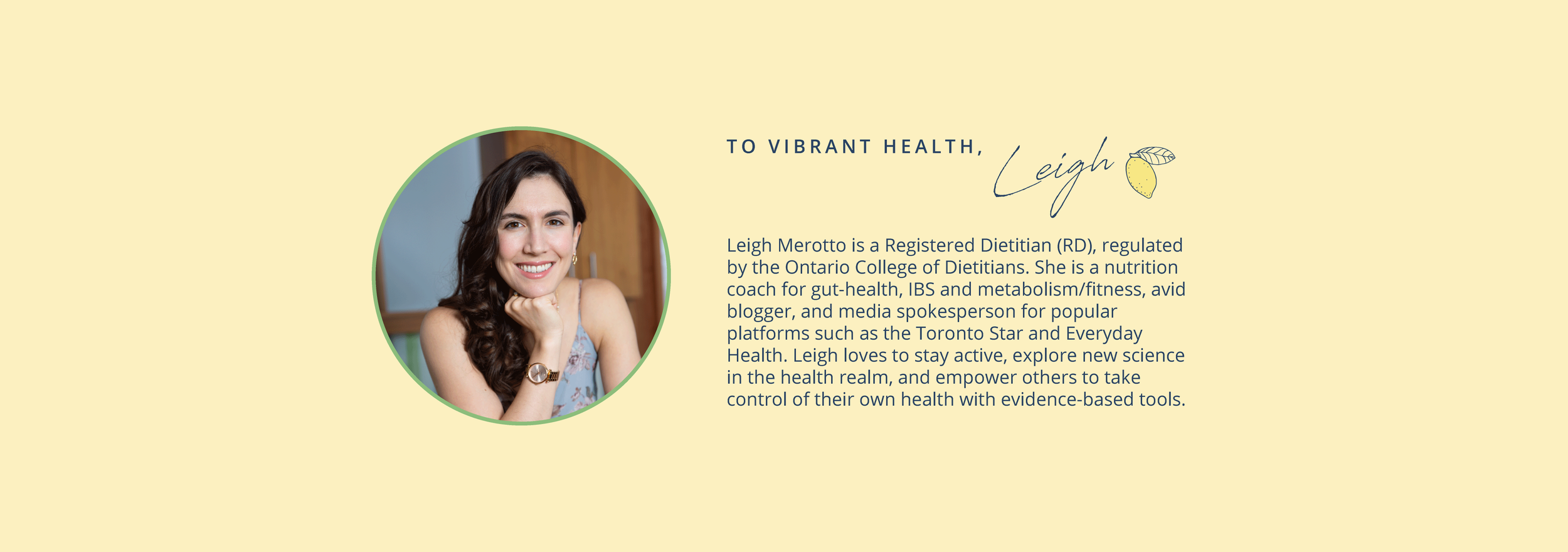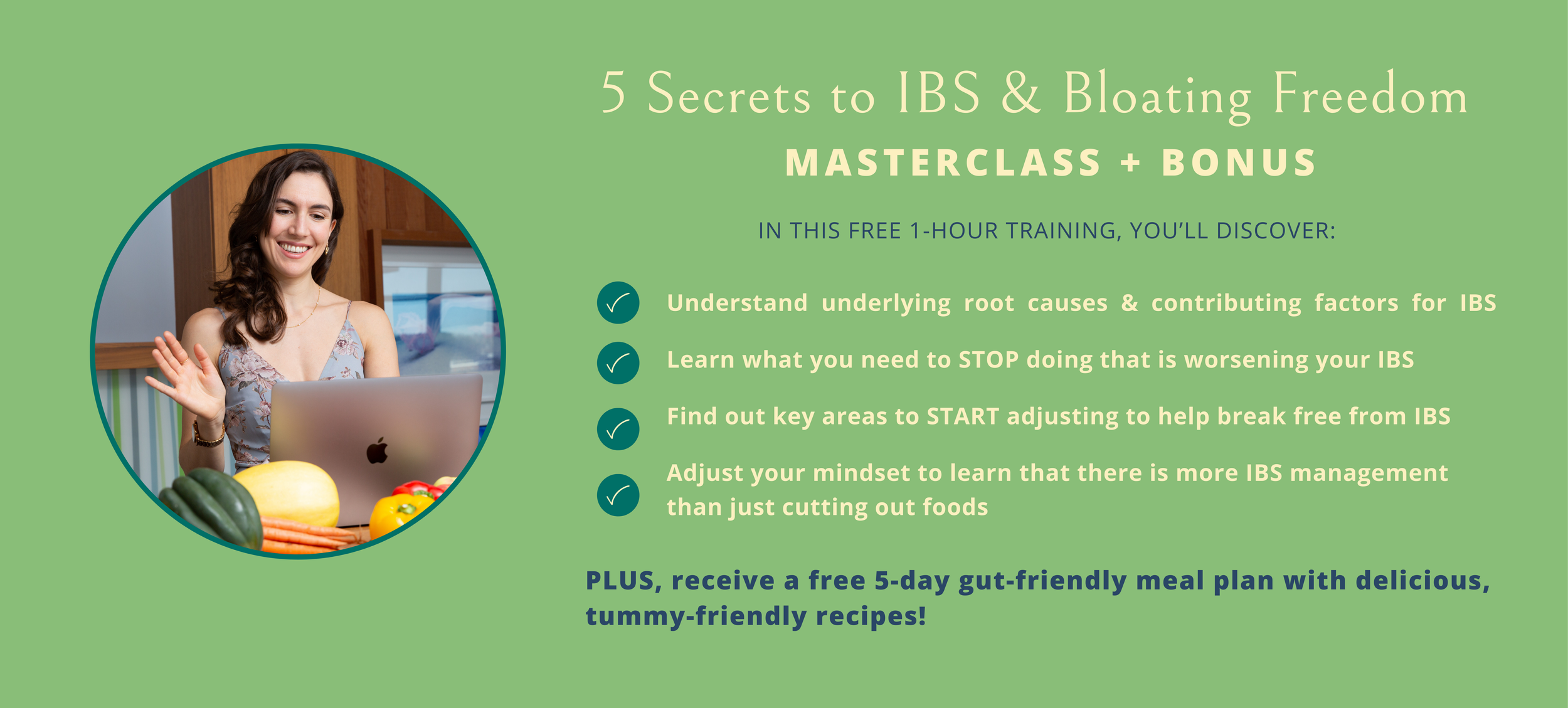How a Gut Health Dietitian Can Help You Find Lasting Relief From IBS
Living with Irritable Bowel Syndrome (IBS) can be incredibly challenging and so impactful to your quality of life.. The unpredictable nature of IBS symptoms, such as abdominal pain, bloating, and changes in bowel habits, can make it difficult to navigate daily activities and enjoy meals.
Not to mention, constantly thinking about how your gut is going to react from one day to the next!
So, you’re looking for how to treat your IBS and wondering who can help support you in that journey?
Well, here’s an honest low-down on why a specialized Dietitian (such as myself), should be a key part of your care team in order to find lasting relief from IBS and digestive symptoms like bloating, pain, constipation and/or diarrhea.
What is a Dietitian?
Registered Dietitians are regulated health professionals and are the experts in nutrition care and medical nutrition therapy. This means that Naturopaths, Chiropractors, acupuncturists and “health coaches” are NOT licensed experts in nutrition, and quite honestly, probably should not be your main source of nutrition planning and counseling.
DIETITIAN vs. NUTRITIONIST
Did you know that a Registered Dietitian is a protected title, whereas 'Nutritionist' is a term anyone can freely use? Make sure to check credentials when you are getting your health + nutrition info (especially on social media!).
To become a Registered Dietitian in Canada, one must:
Complete an accredited undergraduate program in nutrition
Complete a 8-12 month dietetic internship (and meet competencies related to clinical, public health, food service, and nutrition care)
Write and pass the national board exam (Canadian Dietetics Registration Exam)
Register with their provincial college (I am Registered with the College of Dietitians Ontario), and renew annually
Engage in ongoing professional development standards
A side note… I decided to pursue this profession because I valued the dedication to evidence-based and client-centered care, and our duty to adhere to a high set of standards for practice!
DIETITIAN SPECIALIZING IN GUT HEALTH
A Dietitian specializing in gut health should work with a large base of clients and have training in both counseling and coaching, but also advanced strategies relevant to digestive health such as foods for motility and the microbiome, and integrative approaches such as sleep, stress and mindful eating.
It’s important to work with someone who focuses primarily on gut-health in their Dietetic practice, as it is such a complex and ever-changing field that you will likely want someone who stays on top of the current evidence, treatments and research.
Why a Dietitian Should Be Part of Your IBS and Gut Health Care Team
So now that we understand what IBS is, and that Dietitians are the experts in nutrition, let’s get into why Dietitians should be part of your IBS and gut health care team.
UNDERSTANDING IBS AND THE ROLE OF DIET:
Although the exact cause of IBS is unknown, it is thought to have some underlying symptom drivers including dysbiosis, motility issues, altered gut-brain connection, and low grade inflammation. Certain triggers, including dietary factors, can exacerbate symptoms.
This is where a dietitian comes in! A gut health Dietitian can help you identify personal dietary triggers, as well as help you meet nutritional needs and balance fiber intake to help rebalance your gut microbiome, lower inflammation and heal your gut.
P.S. Want to learn more about finding lasting freedom from IBS and painful bloating? Be sure to watch my FREE masterclass!
PERSONALIZED DIETARY & LIFESTYLE RECOMMENDATIONS
Every person with IBS experiences different triggers and tolerances when it comes to food. A dietitian will work closely with the individual to understand their unique symptoms, dietary habits, and goals. When first working with clients, we conduct a comprehensive assessment to identify potential trigger foods and develop a personalized nutrition care plan.
In my Gut Harmony Method program, clients keep a detailed food and gut journal, as well as send through bloodwork and medical history before our first session so that we can have a detailed assessment of underlying symptom causes and create an action plan (with nutrition and lifestyle goals) to address them.
LOW FODMAP DIET HELP
The low FODMAP diet is much more popular these days, and has gained recognition as an effective dietary approach for managing IBS symptoms. FODMAPs are types of carbohydrates that can ferment in the gut, leading to gas, bloating, and other discomforts. A dietitian can guide individuals through the low-FODMAP diet, ensuring proper implementation and monitoring.
We help you identify suitable foods, educate on label reading, and help with meal planning and prepping to ensure nutritional adequacy while avoiding trigger foods. Learn more about the low FODMAP diet here.
EDUCATION AND EMPOWERMENT
Dietitians practice through an evidence-based and food first approach, meaning that we help you actually make dietary and lifestyle changes to support your gut health, rather than bandaid solutions like fancy supplements, tests and cleanses. Throughout the journey with my clients, I provide you with evidence-based information about gut health, the impact of diet, and the rationale behind specific recommendations.
Dietitians can help you understand how food choices influence your symptoms and teach you how to make informed decisions when it comes to your diet. Moreover, we can help debunk myths and misconceptions surrounding IBS and provide evidence-based information to empower you in making informed decisions about their diet and lifestyle. Because let’s face it.. There is a LOT of garbage information out there on social media, and it is confusing if you’re not an expert in it!
BEHAVIORAL MODIFICATION AND SUPPORT
Adapting to a new diet and managing IBS and digestive symptoms can be emotionally and socially challenging. A dietitian can offer much-needed support and guidance throughout the journey. We can help you navigate social situations, dining out, and grocery shopping while keeping your dietary restrictions in mind. Furthermore, a dietitian can address any emotional barriers or disordered eating patterns that may arise as a result of IBS.
MONITORING AND FOLLOW-UP
Let’s be honest.. Dietary management of IBS is NOT a one-size-fits-all approach. Managing IBS is an ongoing process and journey that may require adjustments and fine-tuning. Regular follow-up appointments will allow us to assess your progress, track symptom changes, build on goals, and make necessary modifications to your care plan. As a Dietitian, my goal is to be there to support you throughout your gut healing journey, providing accountability and adapting your strategies as needed.
Conclusion
Living with IBS can be oh-so challenging, but with the support of a dedicated gut health dietitian like myself, you CAN regain control of your digestive health!
Through a comprehensive assessment, personalized recommendations, education, ongoing support, and regular follow-up, we can help you manage your symptoms effectively and heal your gut.
Summary:
IBS is a functional gut disorder. Each person’s dietary and lifestyle triggers are unique, however common underlying symptom drivers include dysbiosis, low-grade inflammation, and altered gut-brain connection.
Registered Dietitians are regulated health professionals and are the experts in nutrition care and medical nutrition therapy; ‘Registered Dietitian’ is a protected term
Your IBS and digestive system is constantly changing, and regular monitoring and follow-up is important to successful IBS and digestive health management.
A specialized Dietitian can help you identify food and lifestyle triggers, improve your diet to help rebalance your microbiome and lower inflammation, and create sustainable habits to live your life freely with minimal symptoms.
Ready to work towards optimizing your well-being and improving your quality of life? If you are ready to take the next step on your IBS and gut health journey, learn more and apply for my 1-1 coaching program here.









